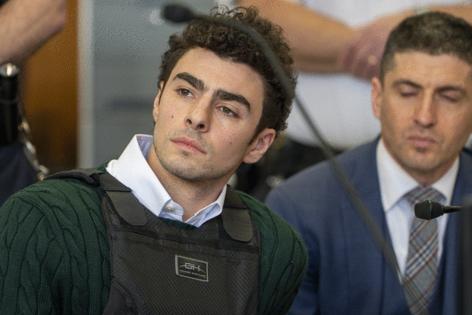Mangione wants death penalty count tossed in CEO murder case
Published in News & Features
Lawyers for Luigi Mangione asked a federal judge to dismiss the murder count that could lead to his execution if he were convicted of killing UnitedHealth Group Inc. executive Brian Thompson.
Mangione’s lawyers said prosecutors are improperly seeking the death penalty by tying the murder to another crime of violence. The crime they charged, stalking, doesn’t require the intentional use of force and shouldn’t trigger the possibility of capital punishment, Mangione’s lawyers argued in a court filing early Saturday.
Mangione, 27, is accused of fatally shooting Thompson outside a midtown Manhattan hotel, where the executive was slated to speak at a company investor conference last December. Mangione was arrested in a McDonald’s restaurant in Altoona, Pennsylvania, after a five-day national manhunt.
The case has drawn intense national interest as Mangione has been cheered by fans who say he expressed their rage at the health care system, while members of President Donald Trump’s administration have said he should be convicted and have linked him to “left-wing” extremism.
Mangione also faces second-degree murder and other charges in New York state court.
In their filing, Mangione’s lawyers also urged U.S. District Judge Margaret Garnett to throw out evidence from a backpack seized during his arrest, arguing officers searched his bag without obtaining a warrant. Police questioned Mangione for more than 20 minutes before reading him his rights and blocked him from leaving the McDonald’s even though they initially told him he wasn’t under arrest, according to the filing.
Police realized they had made a “potentially devastating mistake by thoroughly searching the backpack of a murder suspect” without a warrant, Mangione attorney Karen Agnifilo Friedman argued. The filing includes five photographs of Mangione as police interacted with him inside the restaurant.
Authorities have said they seized writings by Mangione that link him to the shooting, as well as other critical pieces of evidence that prosecutors used in building their case. If the judge doesn’t allow the contents of the notebooks, prosecutors would might have a harder time proving a case that would still be supported by videos of the murder and other evidence.
The government’s response is due by Nov. 14. The U.S. Justice Department didn’t return a message seeking comment.
Last month, Judge Garnett warned Justice Department officials to stop making statements that link Mangione to “left-wing” extremism, saying there could be punishments for future comments. Defense lawyers have argued that administration officials improperly linked Mangione to other recent acts of political violence, such as the murder of Charlie Kirk in Utah.
On Sept. 16, a New York state judge dismissed first-degree murder charges against Mangione but allowed a lesser murder count to go to trial, ruling that prosecutors failed to show that he committed the crime as an act of terrorism. Judge Gregory Carro ruled prosecutors could still pursue a second-degree murder charge and eight other counts against Mangione.
©2025 Bloomberg L.P. Visit bloomberg.com. Distributed by Tribune Content Agency, LLC.







Comments